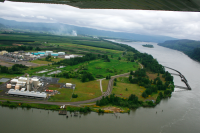Oregon Land Use Board of Appeals reviews proposal to open high-value farmland in Columbia County to Industrial Development, written ruling scheduled for November 29, 2018.
FOR IMMEDIATE RELEASE
Appeals Board Weighs Challenge to Controversial Plans to Expand Columbia River Port

Nov. 1, 2018 (Salem, OR)—Today the Oregon Land Use Board of Appeals heard arguments in a case challenging Columbia County’s second attempt to open 837 acres of high-value agricultural land along the Columbia River to industrial development. The Port of St. Helens proposes doubling the size of its rural Port Westward property for a fracked gas-to-methanol refinery, a biodiesel plant, and other industrial development. Hundreds of people, including local farmers and small business owners, urged the county to protect farmland and salmon habitat from fossil fuel and other heavy industrial development. Earlier this year, Columbia Riverkeeper and 1000 Friends of Oregon challenged Columbia County’s decision to approve the rezone.
“People value high-yield farmland and strong salmon runs,” stated Jasmine Zimmer-Stucky, Senior Organizer for Columbia Riverkeeper. “Industrializing rural Columbia County with dirty fossil fuel projects like fracked gas-to-methanol refineries and oil-by-rail ignores the public’s legitimate concerns about health and quality of life impacts.”
Port Westward is ground zero for a string of controversial fossil fuel developments, including fracked gas, coal, and oil terminals. The Port of Columbia County (formerly the Port of St. Helens) signed a lease option with Northwest Innovation Works to build the world’s largest fracked gas-to-methanol refinery at Port Westward. From 2013 to 2015, Global Partners operated an oil-by-rail transshipment facility before resuming ethanol shipments; the company maintains regulatory approval to restart oil shipments. Portland General Electric currently operates two gas-fired power plants at Port Westward. And in 2013 and 2014, the Port failed in attempts to site two coal export terminals at Port Westward.
“Hopville Farms has been working for years to successfully develop a blueberry growing enterprise, and we counted on Exclusive Farm Use zoning and clean water when we invested in the area,” stated James Hoffmann, owner of Hopville Farms. “Converting agricultural lands into an energy industrial complex dooms the Lower Columbia River and jeopardizes the livelihood and safety of the local community.”
Today’s hearing marks the second time the Oregon Land Use Board of Appeals has weighed-in on the legality of opening high-value farmland for industrial development at Port Westward. In 2014, a local farmer and Columbia Riverkeeper challenged a similar proposal. The Board found the county’s decision violated Oregon laws designed to protect high-quality farmland and remanded the rezone back to local decision-makers. Despite years of opposition from neighbors, farmers, and conservation groups, the county approved the rezone for a second time.
“We are disappointed that the Port continues to push this proposal. In addition to our concern about the conversion of over 800 acres of highly productive farmland for fossil fuel development, we believe the Port has simply not demonstrated that its proposal meets the high legal threshold for a rezone of farmland for industrial uses,” said Meriel Darzen, staff attorney for 1000 Friends of Oregon.
Next Steps:
Oregon Land Use Board of Appeals will issue a written ruling on November 29, 2018, which will be available online.
Resources:
FOR IMMEDIATE RELEASE: Media Alert, 10/30/18
Hearing On Controversial Proposal To Rezone High-Value Farmland For Industrial Development Along Columbia River
- WHAT: Oregon Land Use Board of Appeals Hearing on proposal to open high-value farmland in Columbia County to Industrial Development scheduled on November 1, 2018, in Salem, Oregon.
On March 14, 2018, Columbia Riverkeeper filed an appeal challenging Columbia County’s second attempt to open 837 acres of high-value agricultural land along the Columbia River to industrial development. 1000 Friends of Oregon, Oregon’s statewide land use watchdog, joined Riverkeeper’s appeal.
- WHO: The Port of St. Helens proposes doubling the size of its rural Port Westward property for fracked gas-to-methanol refineries, oil-by-rail, and other industrial development. Hundreds of people, including local farmers and small business owners, urged the county to protect farmland and salmon habitat from fossil fuel and other heavy industrial development.
- WHEN: Thursday, November 1, 2018, at 11 a.m.
- WHERE: Oregon Department of State Lands Building, 775 Summer Street NE (1st Floor) in Salem, OR.
- WHY: The county’s decision marks the Port of St. Helens’ second attempt to remove agricultural protection for farmland at Port Westward. In 2014, a local farmer and Columbia Riverkeeper appealed a Columbia County decision to rezone the Port Westward property for industrial use. The Oregon Land Use Board of Appeals found the county’s decision to open farmland for industrial development violated Oregon laws designed to protect high-quality farmland and remanded the rezone back to local decision-makers. Despite years of opposition from neighbors, farmers, and conservation groups, the county approved the rezone for a second time.
Columbia Riverkeeper is represented by Crag Law Center, a client-focused law center that supports community efforts to protect and sustain the Pacific Northwest's natural legacy.
###


